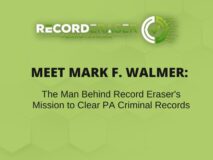
Even if you’ve grown as a person and paid your dues to society, a criminal record can have a lasting effect on your life. This list of offenses on your record makes it harder to find access to employment, housing, enrollment in higher education, and even certain licenses or professional certifications; To make matters worse, if your peers find out, it might even hurt your social reputation.
This record is usually maintained by the police department or criminal court system of the respective jurisdiction; it includes information about arrests, convictions, and sentences for any crimes that have been charged, whether they were on a local, state, or federal level. All in all, they’re pretty condemning documents – even for minor offenses, and charges you were not convicted of – a record can have adverse consequences on your future. However, the good news is that it’s possible to clear your criminal record, depending on the state you live in and the nature of your offense.
We hear you; like so many other Americans, you’re asking questions like these:
- “How can I clear my record?”
- “Who can review records of my arrests?”
- “If I clear my criminal record, will it still be available for public access?”
- “How long will it take to clear my record?”
- “Who can help me clear my criminal record?”
- “Are my criminal records eligible for an expungement?”
- “Does how the Clean Slate law impact me?”
- “How do I get this done?”
Don’t worry; this article will help you find the answers to these questions and the support you need to clear your name.
If you’re looking to clear your criminal records, PA gives you three main ways to do this: expungement, pardons, and record-sealing. These methods have different requirements and can take different amounts of time; we’ll get to the details in a moment. The information on this page ONLY relates to Pennsylvania criminal charges.
First, let’s look into how criminal records are obtained.
How Do People Get Criminal Records?
People get criminal records whenever they’re arrested, charged, convicted, or sentenced for crimes. This “rap sheet” summarizes your criminal history, though the specific details included within it vary between states.
If you want to see your record, you have the right to obtain a copy. You can request it from the FBI, your state police, your state bureau of inquiry, or your state public safety office, but you might have to submit your fingerprints to get it. Keep in mind that if you get a record from your local police station, it might only contain information from the area that you got it from. This means that if you’ve been convicted within other jurisdictions, these convictions may be missing from this version. If you need a comprehensive version, you can ask one of the officers at your local station what they include and exclude in their records to find out if it will be good enough for your purposes.
In Pennsylvania, you can search your own record here at the UJS Portal. If you find your record, you can send it to us to review – mark@recorderaser.net.
How to Expunge Your Criminal Record
As many as one in three Americans have a criminal history hanging over their heads, making it harder to find jobs, apartments, and public resources. In PA, criminal records can be cleared if there have been a few years of good behavior, or if you are eligible for an expungement. However, there are many legal hoops to jump through to remove criminal records. It’s not always easy, but it is possible, and it’s always worth the payoff. If you’re confused by this, we are here to help.
Criminal Records That Can Be Expunged in PA
In PA, criminal records can be expunged for non-convictions, convictions of summary offenses, and certain criminal convictions that occurred when the offender was a juvenile.
You can file a request for expungement if:
- You’ve completed five years of good conduct after receiving a summary offense.
- The criminal charges against you weren’t proven in court. This includes records like dismissed cases, withdrawn cases, cases where you were found not guilty, and nolle prossed cases (cases in which either the prosecutor or the plaintiff decides to drop the case before or during the trial).
- You are over the age of 21 and have a conviction for the summary offense of Underage Consumption.
- You’ve earned Accelerated Rehabilitative Disposition (ARD), the Small Amount Marijuana Program, or Section 17 probation and successfully completed the program.
- You’re 70 years old or older, and you haven’t been arrested in the last ten years.
- You have convictions that have been pardoned by the Governor.
However, legal requirements can make it harder to get an expungement if:
- You’ve been convicted of a felony offense or misdemeanor and haven’t received a pardon.
- The juvenile case you’re trying to expunge was followed by further convictions, hearings, and/or appeals; you have not completed your sentence for your juvenile case after five years, or your juvenile case involved sex offenses.
At the time of your request, you must not have any current charges against you, and your criminal record must otherwise be clean. Expungement is only available for a single summary offense, not a series of criminal arrests.
The Criminal Expungement Process in Pennsylvania
The Expungement process in Pennsylvania can take a few months, and it requires you to submit paperwork and pay fees. However, it’s not terribly complicated. These are the typical steps involved in expunging your criminal record in Pennsylvania:
- To begin, request your PSP E-Patch criminal history.
- Complete the 490 or 790 form.
- The Clerk of Courts in the county where your arrest occurred will be able to give you further instructions on how to proceed with asking the court for expungement.
- After the Pennsylvania State Police obtained a court order for erasure signed by a Commonwealth Court judge, the record will be expunged.
READ: About Pennsylvania’s New Clean Slate Law
Expungements vs. Pardons
While we’ve talked about expungements in PA, criminal convictions can’t always be cleared away by expungements. In this case, you will have to consider applying for a criminal pardon.
When the Governor of Pennsylvania pardons someone for a crime or multiple crimes, this is called an act of clemency or forgiveness. Pardons allow you to regain all of the rights and benefits taken from you because of your conviction. Frequently, they’re the only option available for erasing the stigma associated with your criminal conviction.
If you’re granted a pardon, you’ll be relieved of all legal ramifications of your conviction, including any fines and imprisonment. After you’re pardoned, you can apply to have your record expunged from the public record. Overall, this will relieve the additional pressures placed on you by your criminal record. It will no longer impact your chances of obtaining a job, housing, or your chances of being denied your right to use public programs.
PA Pardon Process
Anyone who has been convicted of a misdemeanor or felony criminal offense in Pennsylvania can apply for a pardon from the Governor. The first step is to obtain an application from the Board of Pardons (which we can do for you). The application and all supporting documentation must then be requested from the Courts and submitted to the Board and tracked for two years, (which we can also do for you).
The Board reviews your application and makes a recommendation to the Governor. The Governor then makes a decision based on the recommendation and their own opinion of your criminal history. If you’re granted a pardon, the criminal record of your conviction will then be eligible for an expungement and will then be erased from criminal databases and public records.
Whether you choose to pursue pardons or criminal expungement, speaking with an experienced pardon attorney who can guide you through the process is essential. They can help you determine if you’re eligible and then help you compile all of the tedious paperwork that goes into it.
Pardon Process vs. Expungement Process
The criminal pardon process in Pennsylvania is separate from the criminal expungement process. While pardons are intended for those who have a misdemeanor or felony convictions, criminal record expungements are designed to remove certain criminal records from the public record, so they no longer appear on background checks.
An expungement is a court order that directs all relevant law enforcement agencies to remove your criminal charge from their records once you’ve served your sentence. Different offenses have different waiting periods before you can apply for criminal record expungement in Pennsylvania, so consult with an experienced pardon attorney to get support throughout the process. With the help of a knowledgeable attorney, expungement can give you a clean slate and a fresh start.
Get Help From Pardon & Expungement Attorneys at Record Eraser
Do you know if you’re eligible to have your record cleared? Tell us your story; we’ll help you figure out the rest from there.
Record Eraser is a criminal record clearing service that guides you through the criminal expungement process in Pennsylvania. With the guidance of our experts, you can have your criminal record cleared so you can finally leave the past in the past.
Reach out to us today to take the first step towards your new beginning.



